Key takeaways:
- Understanding the rules and protocols of equestrian competitions is crucial for success and avoiding frustration.
- Mental preparation and building a strong bond with your horse are key to performing well in competitions.
- Emphasizing both technical skills and emotional intelligence can enhance a competitor’s experience and performance.
- Thorough planning, including checklists and practice under pressure, is essential for reducing anxiety and improving confidence.
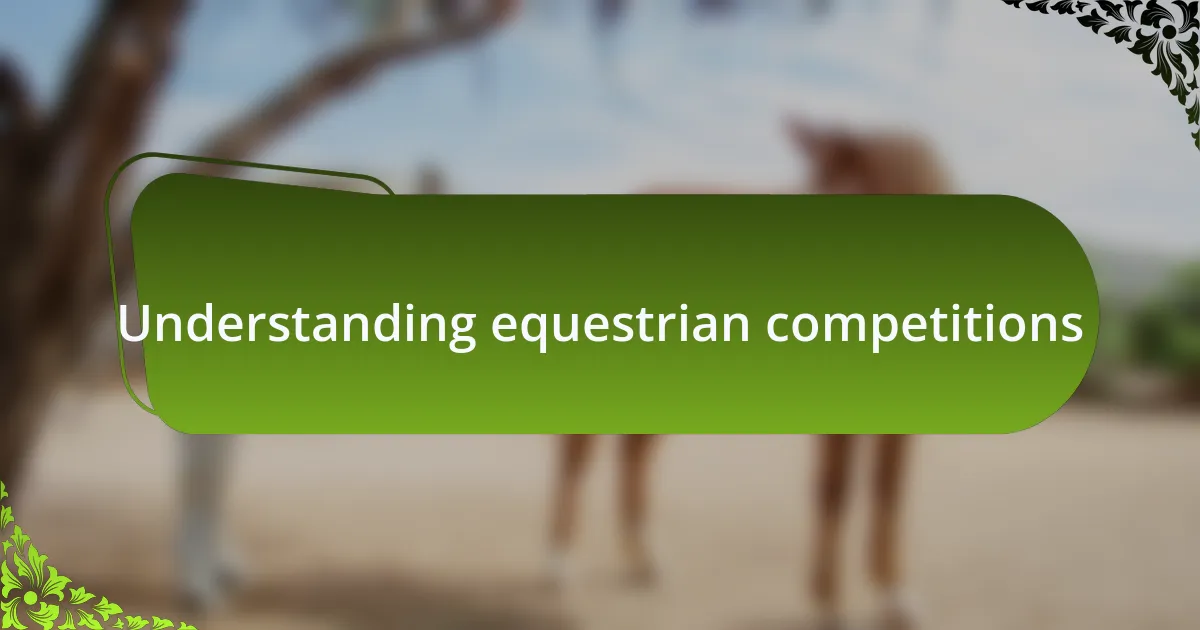
Understanding equestrian competitions
Equestrian competitions can be fascinating yet intimidating, especially if you’re new to the scene. I remember my first show; the adrenaline was palpable as I watched seasoned riders navigate the course with precision. It made me wonder: what were their secrets? Understanding the nuances of different disciplines—for example, dressage, show jumping, or eventing—can help you find where you best fit in.
As I delved deeper into the competition world, I quickly learned about the significance of rules and protocols. Each competition has its own set of guidelines, and not knowing them can set you back. I once misinterpreted a scoring system during a performance and ended up feeling frustrated. That experience taught me the importance of thoroughly reviewing the competition details before entering.
Networking plays a crucial role in the equestrian community, and I didn’t realize how much until I needed support. Engaging with fellow riders can uncover invaluable tips and insights, enhancing your preparations and performance. Have you ever felt lost? I know I did, but reaching out made all the difference, turning challenges into shared experiences, and ultimately enriching my journey in equestrian sports.
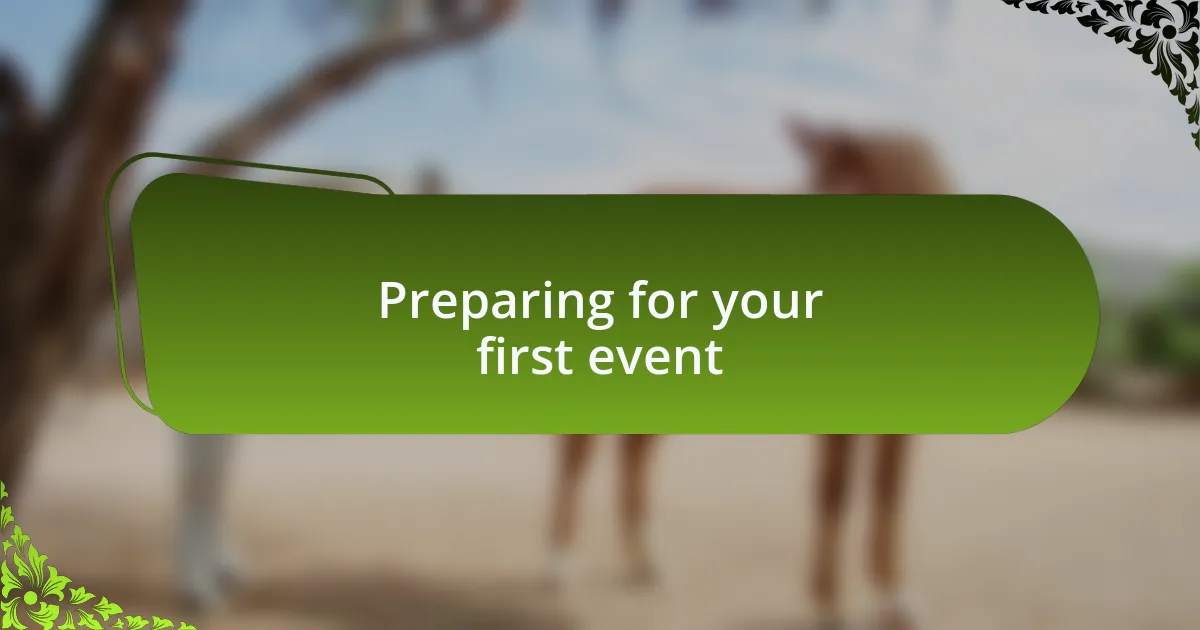
Preparing for your first event
Preparing for your first event requires more than just practice; it’s about creating a plan that covers every detail. I remember meticulously packing my kit the night before, double-checking that I had everything from my boots to my horse’s gear. Did I forget anything? I kept asking myself that question, and the anxiety made me realize the importance of having a checklist. Trust me, it saves you from last-minute panic.
One of the biggest surprises for me was realizing how crucial it is to prepare mentally. I still recall standing by the arena, heart racing, as I watched others perform flawlessly. I learned that self-talk can be a game-changer; telling myself, “I am prepared, and I will enjoy this experience,” transformed my nerves into excitement. Everyone has those jitters, but embracing them can turn a daunting challenge into a thrilling adventure.
Then there’s the significance of the warm-up. It felt a bit overwhelming for me at first, not fully understanding how to get my horse in the right mindset. I discovered that a good warm-up isn’t just physical—it’s about building trust and connection between you and your horse. Thinking back, I remember using soothing tones and giving my horse gentle reassurance. It made a noticeable difference; our performance that day felt like a true partnership. How do you plan to connect with your horse? I believe it’s all about fostering that bond before stepping into the arena.
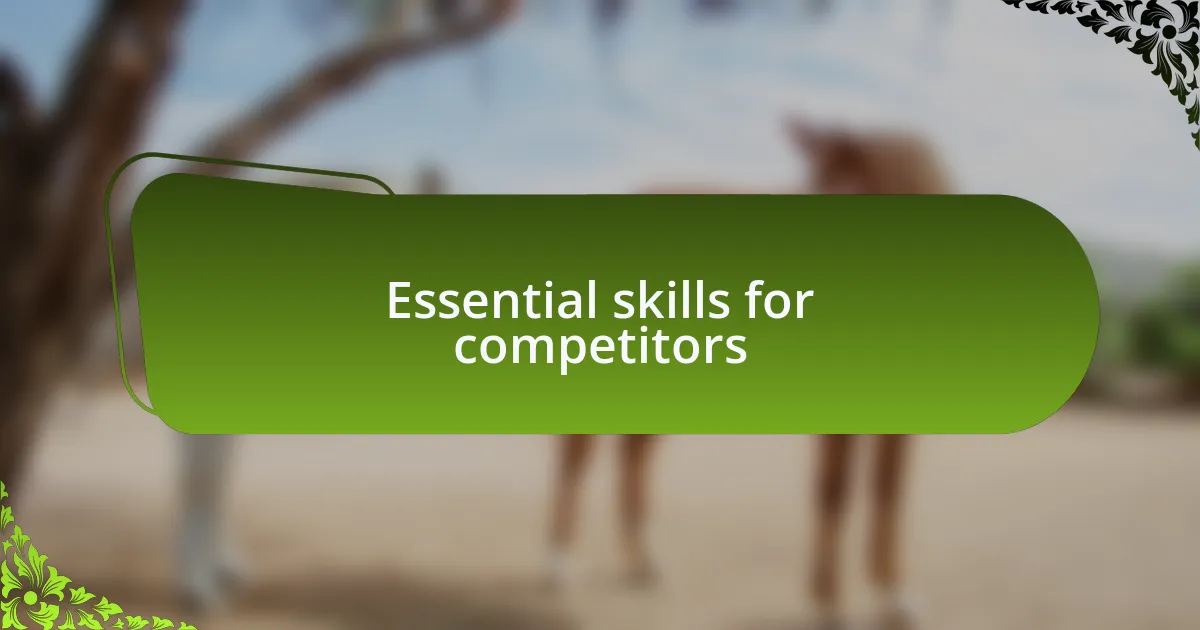
Essential skills for competitors
Every competitor knows that mastering riding skills is just the tip of the iceberg. In my early days, I often overestimated my technical abilities and underestimated the emotional side of competition. Technical skills are imperative, but emotional intelligence—like knowing how to manage fear or excitement—can be the difference between success and stress. Have you ever felt completely confident in practice, only to feel lost in competition? It’s not uncommon.
Communication with your horse is another essential skill that I learned through experience. The first time I competed, I realized I had to be more attuned to my horse’s body language than I ever considered. It’s about reading those subtle cues; a flick of an ear or a change in stride can convey so much. I remember being caught off guard once when my horse tensed up mid-course—if only I had noticed earlier, we could have avoided the hiccup altogether. How tuned in are you to your equine partner? That connection shapes not just your performance but your overall experience.
Lastly, strategic thinking plays a pivotal role in competition that I had to learn the hard way. I remember coming up with a plan for my course but failing to adjust as I went along. Being adaptable during the competition is crucial; sometimes the unexpected happens, whether it’s a change in conditions or a challenging course. Are you ready to think on your feet when it counts? Developing a flexible mindset allows you to turn potential setbacks into opportunities, enhancing your experience in the ring.
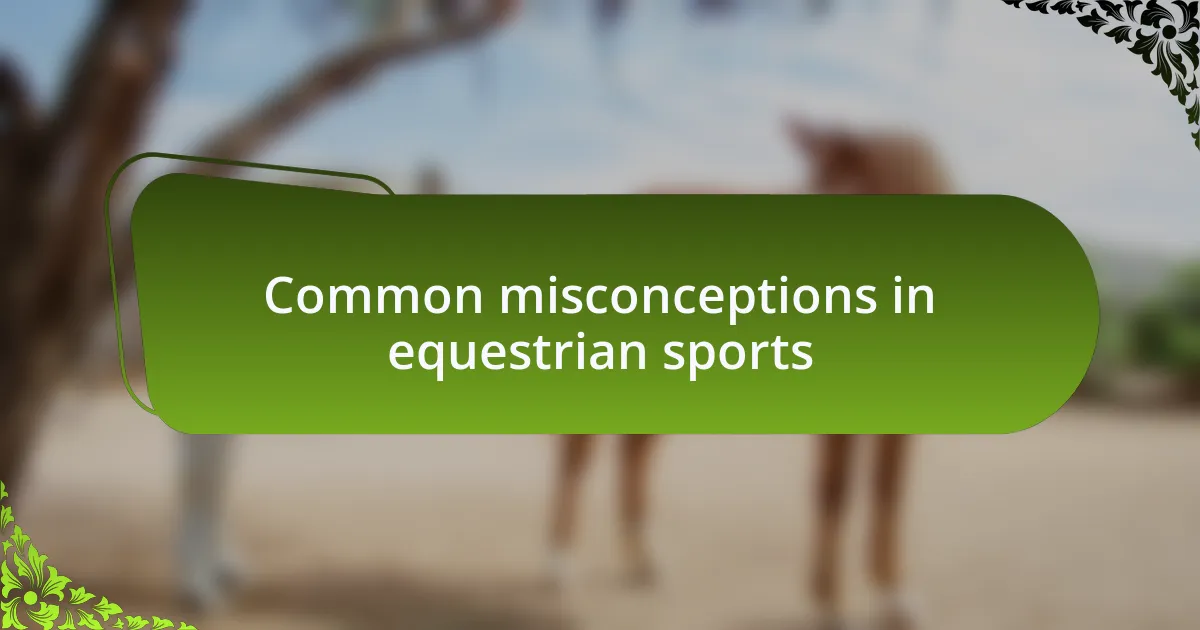
Common misconceptions in equestrian sports
One common misconception in equestrian sports is that riding is solely about the horse. Many people believe that success hinges entirely on equine talent or training, overlooking the rider’s integral role. I remember when friends would watch me compete and say, “Your horse is amazing; you must just sit there!” This couldn’t be further from the truth. The bond and communication between horse and rider are crucial for achieving harmony in sport. Have you considered how your presence affects your horse’s performance?
Another misconception is that equestrian sports are purely for the affluent. While it’s true that costs can add up, many riders I know find creative ways to pursue their passion sustainably. I once shared a barn with riders who pooled resources for care and equipment. This community spirit not only made it more affordable but also enriched our riding experiences. Have you explored the possibility of shared resources or second-hand gear?
Lastly, there’s a belief that equestrian sports are just leisurely activities. In reality, the mental and physical demands are immense. I’ve faced sleepless nights before big events, worrying about every detail from my horse’s health to my own performance. The pressure can be intense, and cultivating resilience is essential. Have you ever felt that blend of excitement and anxiety before a competition? Understanding the commitment behind the scenes can deepen your appreciation for this beautiful sport.
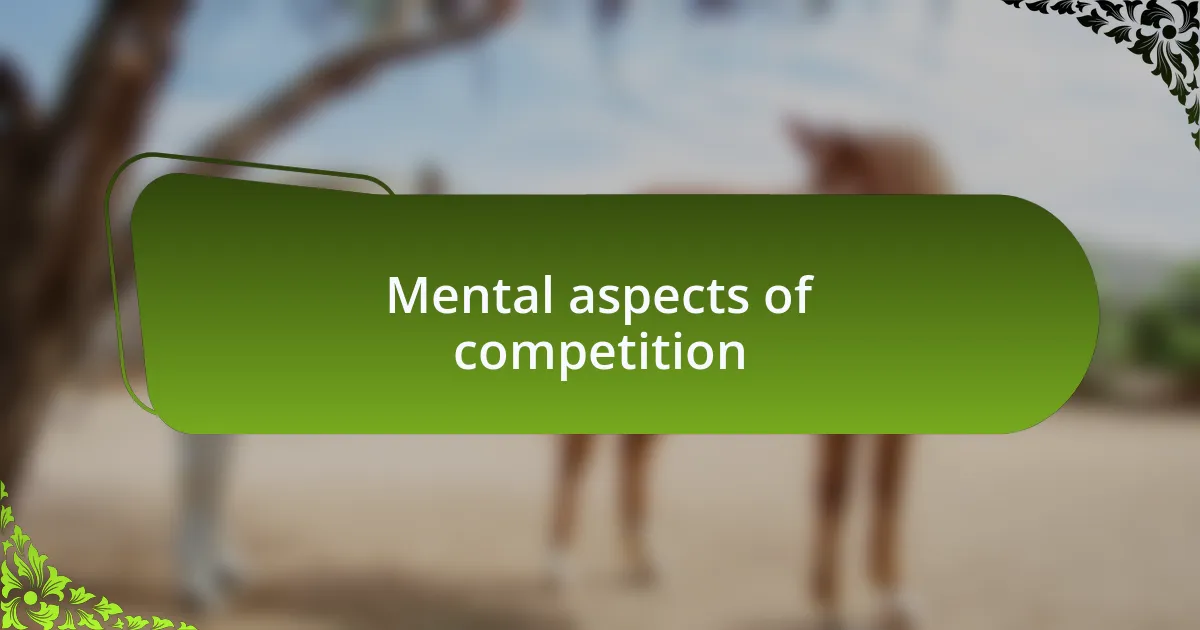
Mental aspects of competition
The mental aspect of competition is something I wish I’d fully appreciated earlier in my equestrian journey. Before my first big show, I was so focused on my riding technique that I neglected the importance of my mindset. I recall standing in the warm-up ring, feeling overwhelmed by the noise and intensity. Have you ever felt like every eye is on you? It’s a surreal experience, and I quickly learned that mental preparation is just as crucial as physical training.
I’ve discovered that managing anxiety before a competition can make a world of difference. One particular night before a regional event, I found myself pacing in my room, rehearsing my routine over and over. It wasn’t until I tried visualization—imagining myself performing at my best—that I felt a wave of calm wash over me. This mental practice transformed my approach and taught me the value of a clear, focused mind. How do you prepare mentally for your competitions?
Another key mental aspect is handling setbacks and learning to embrace the journey. After a disappointing round where I missed several crucial jumps, I felt crushed. But instead of giving in to discouragement, I viewed it as a learning opportunity—one that fueled my passion and drove me to improve. It’s fascinating to consider how resilience shapes not only our performance but our overall enjoyment of the sport. Have you considered how setbacks can become stepping stones on your path to success?

Tips for future competitors
When preparing for a competition, I can’t stress enough the importance of thorough planning. Before my first show, I created checklists for everything, from grooming my horse to packing my gear. This simple act significantly reduced my stress levels on the day of the event. Have you ever felt unprepared and it affected your performance? Taking the time to organize helps you focus on what truly matters—your ride.
It’s also vital to practice under pressure, as real competition settings can be intimidating. I remember during training, I simulated competition scenarios with friends. The adrenaline rush was real, and it taught me how to manage my nerves effectively. How do you think practicing in an environment that mimics competition could enhance your confidence? By embracing the pressure in practice, I found that it became second nature when I actually entered the ring.
Lastly, remember to listen to your body and mind. I once pushed through fatigue to prepare for a major event, only to find myself drained on the day of competition. It was a harsh lesson in self-care. Do you prioritize your well-being as much as your training? Setting aside time to rest and recharge can significantly boost your performance, proving that a healthy competitor is often the most successful.